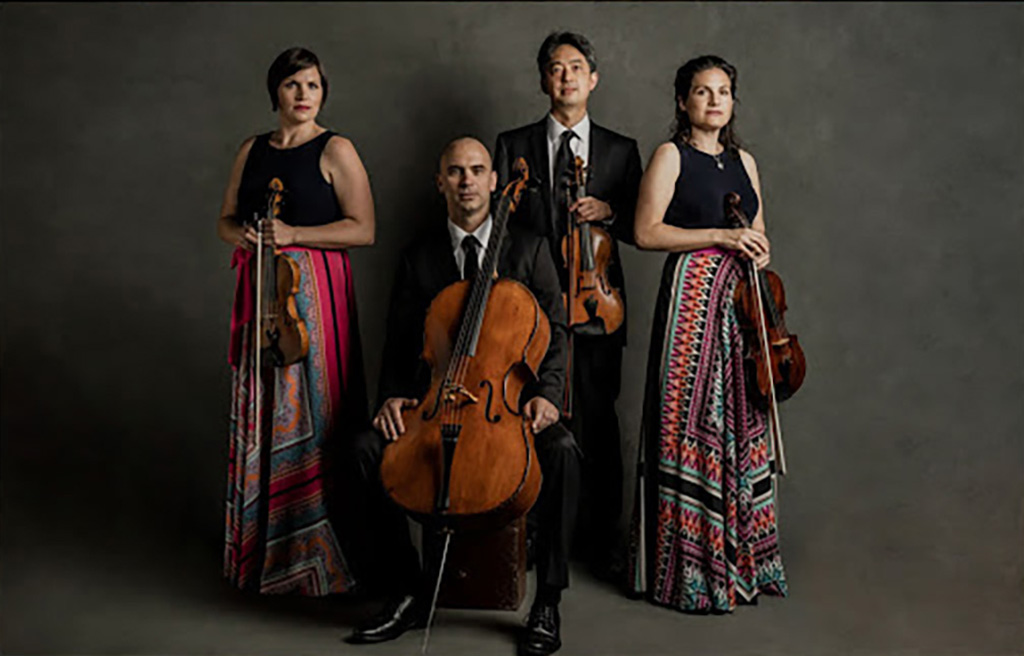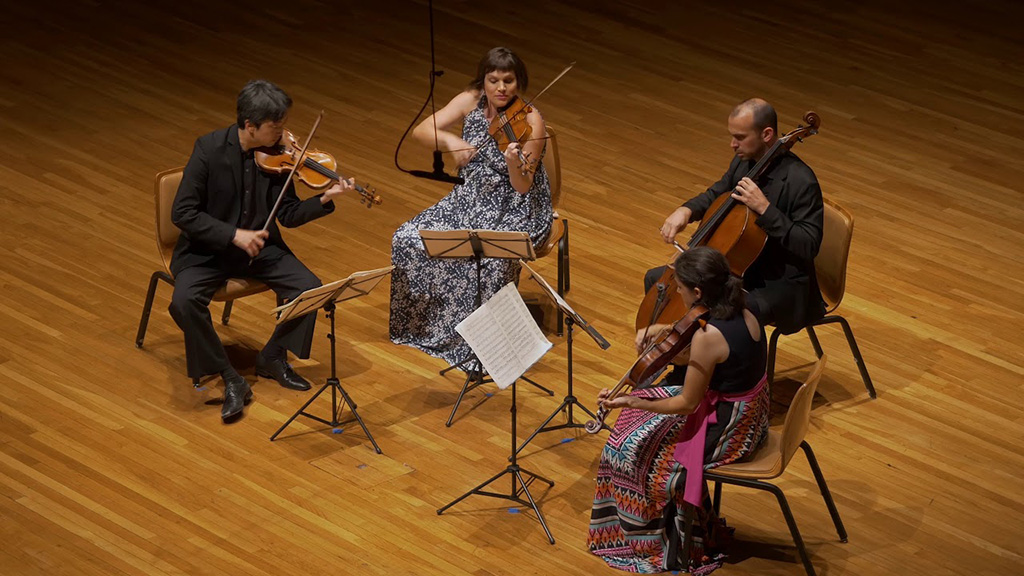Upheaval – Program Title ( KCPA Marquee Series)
The Jupiter String Quartet, longtime artists-in-residence, and faculty at the UIUC School of Music, gave a fall concert on Tuesday, October 3rd. They titled their program “Upheaval,” and chose repertoire by composers who were contending with the realities of political and social uncertainty.
The opening piece of the program was Elizabeth Maconchy’s String Quartet No. 3, which she composed in 1938. Maconchy was an Irish-English composer and avowed socialist,
She studied at the Royal College of Music with Ralph Vaughan Williams and Charles Wood and after that in Prague with Karel Jírak. She had an audible enthusiasm for folk music, fostered by both her study with Vaughan Williams and her interest in the music of Béla Bártok. The 1938 quartet reflects upheaval in Europe—Britain, France, and Italy appeasing a rapidly expanding Germany, and the Spanish Civil War fracturing Spain into Republican and nationalist factions. Maconchy was a known supporter of the Spanish Republicans (against Francisco Franco), and it is this particular upheaval that appears in sound in the quartet. Played in a single movement, the opening is mysterious and emotive. Occasional references to the folk — which, in the early 20th century, is still closely tied to ideas of nationalism — are audible, particularly the pizzicato passages orchestrated between instruments to sound like a classical guitar. Such references are about as close to “folk” as Maconchy gets here; it’s a thoroughly modern quartet, with all of the attendant crunchy harmonies and transitional intensities. Her writing relies on textural shifts and repetition. The soloists pass specific musical gestures back and forth over the background chords, building on their restrained beginning. The Jupiters’ sound is by default very polished and prioritizes clarity — it easily achieves the precision and vigor required for modern and modernist pieces.
Following Maconchy’s quartet, they played Nathan Shields’ Medusa (out of order on the program), which he composed for the Jupiters during his Guggenheim Fellowship. Like Maconchy’s, it is also played as a single movement, but with three distinct sections inspired by three paintings by Caravaggio: The Conversion of St. Paul, Bacchus, and the titular Medusa. They included photos of the art during each section of the piece on screens, the transitions of which gave the audience clear indications of the movements. During the Conversion of St. Paul Shields aurally alludes to chiaroscuro — the striking play of shadows and light in paintings, for which Caravaggio is rightly famous. This creates plenty of work for the cellist and for the lower registers of the viola, especially in lush late-Romantic chords and whispery sul ponticello passages (bowing very close to the bridge). Bacchus, unsurprisingly, sounds the most like Stravinsky of the three movements. The writing calls for dexterity and dramatic string crossings across the board, all while keeping the four parts technically equal. The final section, Medusa, is not aggrandizing Perseus, but isn’t’ celebrating Medusa either. The quartet splits in half—violins on the high end and viola/cello on the low end, and rarely filling the space between.

Carlos Simon’s Elegy: A Cry from the Grave commemorates upheaval closer to home — namely, the murders of Trayvon Martin, Eric Garner, and Michael Brown. The composer’s inspiration came from the prosecuting attorney’s announcement that a selected jury had failed to indict Daren Wilson, who had shot Brown in Ferguson, Missouri. An artistic reflection more than an outcry, the piece attempts to depict injustice in sound — a tall order. Where he might have chosen harsh, modernist chords as a backdrop, Simon instead relies on lyricism for expression. While the chords have plenty of interesting harmonies and some unconventional voice leading, they’re not there to steal the show. Per the quartet’s request, a moment of silence followed the piece before they played William Bolcomb’s “The Graceful Ghost” as a “bonus” unprinted in the program. The piece’s style is early ragtime — gentler and somewhat less “ragged” than the style of later years — and felt a little incongruous in its lightness. Hearing ragtime played by a polished string quartet instead of a jangly saloon piano gives it a very different and pleasant character.
The Jupiters describe themselves as having “a strong connection to the core string quartet repertoire,” so it’s never a surprise to find chamber music warhorses on their programs. They devoted the second half of their program to Beethoven’s String Quartet No. 8 in E minor, Op. 59 No. 2 — the second of the three “Razumovsky” quartets written in 1806 on commission from Count Andreas Razumovsky, then the Russian ambassador to Vienna.
This quartet is one of the many works Beethoven wrote during a time of immense political turmoil in Europe. It’s contemporary to the Eroica symphony, and listeners familiar with the larger work might hear some similar musical impulses in the smaller one. The quartet opens with Beethovn’s flair for dramatic gestures but doesn’t immediately test the boundaries of volume. The piece builds energy by exchanging offset rhythmic sequences and syncopated block chords between parts. The second movement — slow and lyrical, in keeping with tradition — is introspective and emotive. More hallmarks of Beethoven abound: lyricism, particularly high in the first violin part; plenty of solid foundation to keep the violist and cellist busy, and setting the melody with chords shifting around it. Beethoven was many things, but he was not an opera composer. Here, that’s an asset. The third movement, also per tradition, is lighter and less serious, gaining its levity from witty instrumental interplay instead of dramatic gestures. Finally, the final movement takes the energy and expectations built up in the previous three movements and uses all of it. When Beethoven marks a movement “Presto” (168–177 beats per minute), he means it. Dexterity really is the secret sauce here, and it’s part of why the Jupiters keep this piece in their core repertoire.
Catch the Jupiters in their upcoming fall concerts:
Sunday, October 8, 2023, Smith Recital Hall (UIUC Campus, Urbana, IL)
Chamber Music Concert at University of Illinois
Arensky: Quartet No. 2 in A minor Op. 35 with Raman Ramakrishnan, cello
Elgar: Piano Quintet in A minor Op. 84 with Benjamin Hochman, piano
Sunday, October 29, 2023, Smith Recital Hall (UIUC Campus)
Faculty Concert Collaboration with Bill Moersch, percussion
Music by Zack Browning and Akemi Naito
Friday, November 10, 2023, Krannert Center for the Performing Arts
Jupiter String Quartet performs with guests at the Krannert Center.
Su Lian Tan: Life in Wayang
Wynton Marsalis: Excerpts from String Quartet No. 1, At the Octoroon Balls
Antonín Dvořák: Viola Quintet In E-flat Major “American,” Op. 97 B. 180 with Kirsten Doctor, viola








